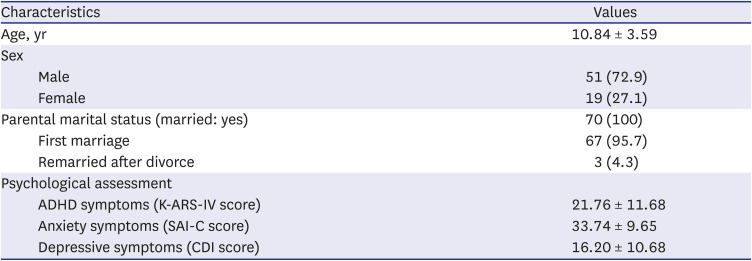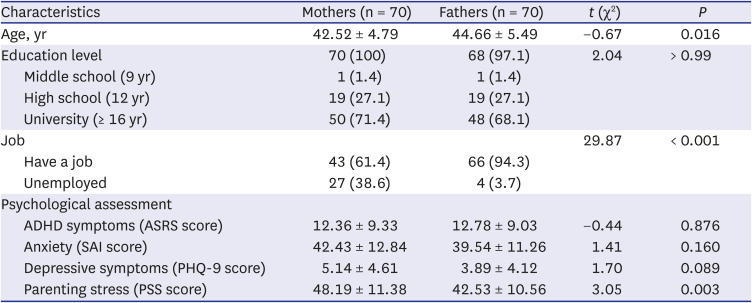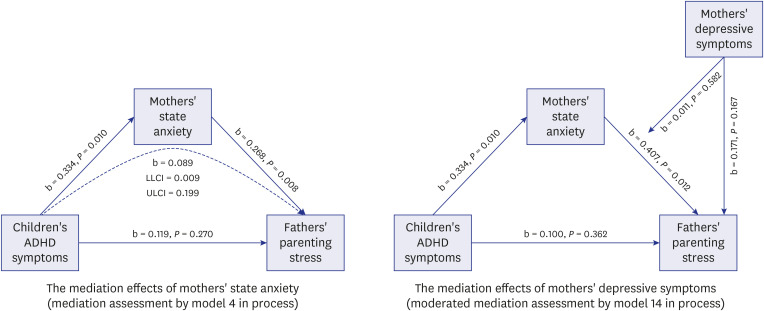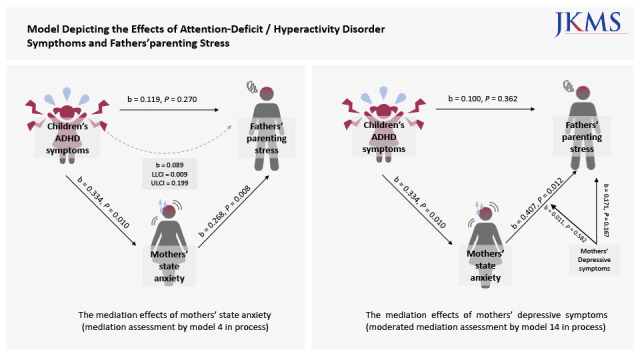1. Patterson GR. Coercion as a basis for early age of onset for arrest. McCord J, editor. Coercion and Punishment in Long-term Perspectives. Cambridge, UK: Cambridge University Press;1995. p. 81–105.
2. Storebø OJ, Ramstad E, Krogh HB, Nilausen TD, Skoog M, Holmskov M, et al. Methylphenidate for children and adolescents with attention deficit hyperactivity disorder (ADHD). Cochrane Database Syst Rev. 2015; 2015(11):CD009885.
3. Edwards G, Barkley RA, Laneri M, Fletcher K, Metevia L. Parent-adolescent conflict in teenagers with ADHD and ODD. J Abnorm Child Psychol. 2001; 29(6):557–572. PMID:
11761288.
4. Fletcher KE, Fischer M, Barkley RA, Smallish L. A sequential analysis of the mother-adolescent interactions of ADHD, ADHD/ODD, and normal teenagers during neutral and conflict discussions. J Abnorm Child Psychol. 1996; 24(3):271–297. PMID:
8836802.
5. Graziano PA, McNamara JP, Geffken GR, Reid A. Severity of children’s ADHD symptoms and parenting stress: a multiple mediation model of self-regulation. J Abnorm Child Psychol. 2011; 39(7):1073–1083. PMID:
21629991.
6. Theule J, Wiener J, Tannock R, Jenkins JM. Parenting stress in families of children with ADHD: a meta-analysis. J Emot Behav Disord. 2013; 21(1):3–17.
7. Wiener J, Biondic D, Grimbos T, Herbert M. Parenting stress of parents of adolescents with attention-deficit hyperactivity disorder. J Abnorm Child Psychol. 2016; 44(3):561–574. PMID:
26183609.
8. Baker DB. Parenting stress and ADHD: a comparison of mothers and fathers. J Emot Behav Disord. 1994; 2(1):46–50.
9. Mash EJ, Johnston C. A comparison of the mother-child interactions of younger and older hyperactive and normal children. Child Dev. 1982; 53(5):1371–1381. PMID:
7140436.
10. Neff PE. Fathering an ADHD child: an examination of paternal well-being and social support. Sociol Inq. 2010; 80(4):531–553. PMID:
20879176.
11. Liu L, Wang M. Parenting stress and harsh discipline in China: the moderating roles of marital satisfaction and parent gender. Child Abuse Negl. 2015; 43:73–82. PMID:
25676108.
12. Wirth A, Reinelt T, Gawrilow C, Schwenck C, Freitag CM, Rauch WA. Examining the relationship between children’s ADHD symptomatology and inadequate parenting: the role of household chaos. J Atten Disord. 2019; 23(5):451–462. PMID:
29254391.
13. Leitch S, Sciberras E, Post B, Gerner B, Rinehart N, Nicholson JM, et al. Experience of stress in parents of children with ADHD: a qualitative study. Int J Qual Stud Health Well-being. 2019; 14(1):1690091. PMID:
31713473.
14. McDermut JF, Haaga DA, Bilek LA. Cognitive bias and irrational beliefs in major depression and dysphoria. Cognit Ther Res. 1997; 21(4):459–476.
15. Jensen PS, Martin D, Cantwell DP. Comorbidity in ADHD: implications for research, practice, and DSM-V. J Am Acad Child Adolesc Psychiatry. 1997; 36(8):1065–1079. PMID:
9256586.
16. The MTA Cooperative Group. Moderators and mediators of treatment response for children with attention-deficit/hyperactivity disorder: the Multimodal Treatment Study of children with Attention-deficit/hyperactivity disorder. Arch Gen Psychiatry. 1999; 56(12):1088–1096. PMID:
10591284.
17. Faraone SV, Biederman J, Friedman D. Validity of DSM-IV subtypes of attention-deficit/hyperactivity disorder: a family study perspective. J Am Acad Child Adolesc Psychiatry. 2000; 39(3):300–307. PMID:
10714049.
18. Park JL, Hudec KL, Johnston C. Parental ADHD symptoms and parenting behaviors: a meta-analytic review. Clin Psychol Rev. 2017; 56:25–39. PMID:
28601690.
19. Gordon CT, Hinshaw SP. Parenting stress as a mediator between childhood ADHD and early adult female outcomes. J Clin Child Adolesc Psychol. 2017; 46(4):588–599. PMID:
26042524.
20. Miranda A, Tárraga R, Fernández MI, Colomer C, Pastor G. Parenting stress in families of children with autism spectrum disorder and ADHD. Except Child. 2015; 82(1):81–95.
21. Chi TC, Hinshaw SP. Mother-child relationships of children with ADHD: the role of maternal depressive symptoms and depression-related distortions. J Abnorm Child Psychol. 2002; 30(4):387–400. PMID:
12109489.
22. Craig F, Operto FF, De Giacomo A, Margari L, Frolli A, Conson M, et al. Parenting stress among parents of children with neurodevelopmental disorders. Psychiatry Res. 2016; 242:121–129. PMID:
27280521.
23. Ma JL, Lai KY. Paternal and maternal experiences in caring for Chinese children with attention deficit hyperactivity disorder in Hong Kong. Asian Soc Work Pol Rev. 2016; 10(2):185–199.
24. Mirzaaghas R, Kohani Y, Baniasadi H, Tara F. Maternal Anxiety and Attention Deficit Hyperactivity Disorder (ADHD) in Children. J Midwifery Reprod Health. 2014; 2(4):233–237.
25. Podolski CL, Nigg JT. Parent stress and coping in relation to child ADHD severity and associated child disruptive behavior problems. J Clin Child Psychol. 2001; 30(4):503–513. PMID:
11708238.
26. Deault LC. A systematic review of parenting in relation to the development of comorbidities and functional impairments in children with attention-deficit/hyperactivity disorder (ADHD). Child Psychiatry Hum Dev. 2010; 41(2):168–192. PMID:
19768532.
27. McCleary L. Parenting adolescents with attention deficit hyperactivity disorder: analysis of the literature for social work practice. Health Soc Work. 2002; 27(4):285–292. PMID:
12494720.
28. Schermerhorn AC, D’Onofrio BM, Slutske WS, Emery RE, Turkheimer E, Harden KP, et al. Offspring ADHD as a risk factor for parental marital problems: controls for genetic and environmental confounds. Twin Res Hum Genet. 2012; 15(6):700–713. PMID:
22958575.
29. Chung KM, Ebesutani C, Bang HM, Kim J, Chorpita BF, Weisz JR, et al. Parenting stress and child behavior problems among clinic-referred youth: cross-cultural differences across the US and Korea. Child Psychiatry Hum Dev. 2013; 44(3):460–468. PMID:
23073610.
30. Rescorla L, Achenbach T, Ivanova MY, Dumenci L, Almqvist F, Niels NB, et al. Behavioral and emotional problems reported by parents of children ages 6 to 16 in 31 societies. J Emot Behav Disord. 2007; 15(3):130–142.
31. Kim HO, Hoppe-Graff S. Mothers roles in traditional and modern korean families: The consequences for parental practices and adolescent socialization. Asia Pac Educ Rev. 2001; 2(1):85–93.
32. Ra HM, Lee HY. Analysis of research trends on parenting involvement of fathers with early childhood children in Korea. J Fisheries Marine Sci Educ. 2012; 24(2):246–262.
33. American Psychiatric Association. Diagnostic and Statistical Manual of Mental Disorders. 5th ed. Washington, D.C., USA: American Psychiatric Association;2013.
34. Pappas D. ADHD Rating Scale-IV: checklists, norms, and clinical interpretation. J Psychoed Assess. 2006; 24(2):172–178.
35. Jang SJ, Suh DS, Byun HJ. Normative study of the K-ARS (Korean ADHD Rating Scale) for parents. J Korean Acad Child Adolesc Psychiatry. 2007; 18:38–48.
36. Kovacs M. The children’s depression inventory: a self-rated depression scale for school-aged youngsters. [master’s thesis]. Pittsburgh, PA, USA: University of Pittsburgh;1983.
37. Costa NM, Weems CF, Pellerin K, Dalton R. Parenting stress and childhood psychopathology: An examination of specificity to internalizing and externalizing symptoms. J Psychopathol Behav Assess. 2006; 28(2):113–122.
38. Larson K, Russ SA, Kahn RS, Halfon N. Patterns of comorbidity, functioning, and service use for US children with ADHD, 2007. Pediatrics. 2011; 127(3):462–470. PMID:
21300675.
39. Cho SC, Lee YS. Development of the Korean form of the Kovacs’ Children’s Depression Inventory. J Korean Neuropsychiatr Assoc. 1990; 29:943–956.
40. Kim JH, Lee EH, Joung YS. The WHO Adult ADHD Self-Report Scale: reliability and validity of the Korean version. Psychiatry Investig. 2013; 10(1):41–46.
41. Kessler RC, Adler L, Ames M, Demler O, Faraone S, Hiripi E, et al. The World Health Organization Adult ADHD Self-Report Scale (ASRS): a short screening scale for use in the general population. Psychol Med. 2005; 35(2):245–256. PMID:
15841682.
42. Adler LA, Spencer T, Faraone SV, Kessler RC, Howes MJ, Biederman J, et al. Validity of pilot Adult ADHD Self- Report Scale (ASRS) to rate adult ADHD symptoms. Ann Clin Psychiatry. 2006; 18(3):145–148. PMID:
16923651.
43. Heo S, Kim JH, Joung YS, Lee WI, Kim JJ, Sohn SH, et al. Clinical utility of the Korean version of the WHO Adult Attention-Deficit/Hyperactivity Disorder Self-Report Scale screener. Psychiatry Investig. 2018; 15(3):325–329.
44. Spielberger CD, Gorsuch R, Lushene R. Manual for the State-Trait Inventory. Palo Alto, CA, USA: Consulting Psychologists Press;1970.
45. Spielberger CD, Edwards CD, Lushene RE, Montuori J, Platzek D. Preliminary Manual for the State-Trait Anxiety Inventory for Children. Palo Alto, CA, USA: Consulting Psychologists Press;1973.
46. Cho SC, Choi JS. Development of the Korean form of the state-trait anxiety inventory for children. Seoul J Psychiatry. 1989; 14:150–157.
47. Han DW, Lee CH, Tak JK. Standardization of Spielberger’s manual for the state-trait anxiety inventory. Proc Korean Psychol Assoc. 1993; (1):505–512.
48. Spitzer RL, Kroenke K, Williams JB. Primary Care Evaluation of Mental Disorders. Validation and utility of a self-report version of PRIME-MD: the PHQ primary care study. Primary Care Evaluation of Mental Disorders. Patient Health Questionnaire. JAMA. 1999; 282(18):1737–1744. PMID:
10568646.
49. Choi HS, Choi JH, Park KH, Joo KJ, Ga H, Ko HJ, et al. Standardization of the Korean version of Patient Health Questionnaire-9 as a screening instrument for major depressive disorder. J Korean Acad Fam Med. 2007; 28:114–119.
50. Berry JO, Jones WH. The Parental Stress Scale: initial psychometric evidence. J Soc Pers Relat. 1995; 12(3):463–472.
51. Preacher KJ, Hayes AF. Asymptotic and resampling strategies for assessing and comparing indirect effects in multiple mediator models. Behav Res Methods. 2008; 40(3):879–891. PMID:
18697684.
52. Shrout PE, Bolger N. Mediation in experimental and nonexperimental studies: new procedures and recommendations. Psychol Methods. 2002; 7(4):422–445. PMID:
12530702.
53. Bianchi SM, Casper LM, King RB, editors. Work, Family, Health, and Well-Being. Mahwah, NJ, USA: Routledge;2006.
54. Hosley CA, Montemayor R. Fathers and adolescents. In Lamb ME, editor. The Role of the Father in Child Development. 3rd ed. New York, NY, USA: Wiley;1997. p. 163–178.
55. Parke RD. Father involvement: a developmental psychological perspective. Marriage Fam Rev. 2000; 29(2-3):43–58.
56. Elam KK, Chassin L, Eisenberg N, Spinrad TL. Marital stress and children’s externalizing behavior as predictors of mothers’ and fathers’ parenting. Dev Psychopathol. 2017; 29(4):1305–1318. PMID:
28065187.
57. Grych JH, Raynor SR, Fosco GM. Family processes that shape the impact of interparental conflict on adolescents. Dev Psychopathol. 2004; 16(3):649–665. PMID:
15605630.
58. Essex MJ, Klein MH, Cho E, Kraemer HC. Exposure to maternal depression and marital conflict: gender differences in children’s later mental health symptoms. J Am Acad Child Adolesc Psychiatry. 2003; 42(6):728–737. PMID:
12921481.
59. Costin J, Lichte C, Hill-Smith A, Vance A, Luk E. Parent group treatments for children with oppositional defiant disorder. AeJAMH. 2004; 3(1):36–43.
60. DeWolfe NA, Byrne JM, Bawden HN. Early clinical assessment of attention. Clin Neuropsychol. 1999; 13(4):458–473. PMID:
10806460.
61. DuPaul GJ, McGoey KE, Eckert TL, VanBrakle J. Preschool children with attention-deficit/hyperactivity disorder: impairments in behavioral, social, and school functioning. J Am Acad Child Adolesc Psychiatry. 2001; 40(5):508–515. PMID:
11349694.
62. Cunningham CE, Benness BB, Siegel LS. Family functioning, time allocation, and parental depression in the families of normal and ADDH children. J Clin Child Psychol. 1988; 17(2):169–177.
63. Krulik T, Turner-Henson A, Kanematsu Y, al-Ma’aitah R, Swan J, Holaday B. Parenting stress and mothers of young children with chronic illness: a cross-cultural study. J Pediatr Nurs. 1999; 14(2):130–140. PMID:
10337125.










 PDF
PDF Citation
Citation Print
Print




 XML Download
XML Download